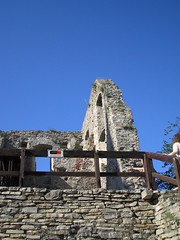Monday, July 17, 2006
If the White Lady is not visible, at least WiFi in Estonia is
This photo is from the Haapsalu castle where the famous White lady sometime appears. If she's not around, look for a hot spot.
Requirements for Learning repositories
The OpenDock project sees a repository as a thin layer which sits between your file system and the rest of the net, controling access and providing information on what is being shared. T
The Bazaar - Bazaar project » What do we want from a FLOSS repository?
technorati tags:LOR, opensource
Blogged with Flock
Wednesday, July 05, 2006
Social web in support of informal learning by Teemu Arina
As Teemu A. was speaking about social web supporting informal learning, I was chatting in Skype with my buddy Sebastian Fiedler at the same time. I've been giving him little updates about the conference, he was not able to come here. Then I opened a Skype audio call with him so that he was also able to listen to Teemu in real-time. (Teemu will make his audio available on his blog at http://tarina.blogging.fi/)
Teemu A. talked about how learning environments are affected by the approach that we take for learning. He put hierarchical approach and network approach of learning on the two end of the dimension, pointing out how connections form in groups. Informal learning is a lot about social interactions, and collecting and using social capital in networks. He mentioned "Connectivism" by George Siemens that outlines that relations are more important in learning than what goes on in the "pipe".
Teemu went on talking about how informal learning among young people take place nowadays. He talked about the shift from mono-chronic learning to polychronic learning where many things take place at the time, plans change rapidly, learning is multidimensional where learners commit to relationships and prefer using asynchronous tool to have layered communication going on.
At the end, Teemu concluded in an anecdotal note that content (I guess for both, formal and informal learning) should be put on the Web, made visible on Google, preferable in rss or any Web-feeds with Creative Commons license. Fun!
euel06
eLearning Conference 2006: session on Foresights in eLearning
Secondly, a Finnish Member of the Finnish Parliament, Jyrki J.J. Kasvi , gave some insights into the work of the Finnish parliamentary committee on the Future foresights . Interestingly, Parliament initiated this committee in 2000 to pro-actively address issues that are important now to shape the future. Mr. Kasvi talked about societal changes that technology has brought and said that what we are seeing now is only the beginning of the "revolution".
Lastly, Mr Pedro from the OECD discussed the impact of ICTs on educational outcomes. He stated that little evidence, both research-based and comparative, is there to show the impact. However, it seems that we can show, for example, that pupils who have access to computers not only in schools, but also at home (frequency of home use is also critical), have more positive learning outcomes. Also, experience in using computers seems to have an important impact in learning outcomes. Some UK data was made available in another session on this too("Children and Young people's home use of ICT for Educational Purposes" Defs 2005).
Home use of computers, of course, brings in the socio-economical status of learners and brings in the issue of digital divide. Interestingly, Mr. Pedro had data from France showing that low-cost technology such as SMS, was used across economic-social status, so the hope is there if frequently used.
Tag: euel06

